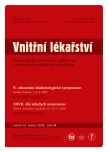-
Medical journals
- Career
Urologic surgery in diabetes
Authors: M. Broďák; M. Romžová; J. Košina
Authors‘ workplace: Urologická klinika Lékařské fakulty UK a FN Hradec Králové, přednosta doc. MUDr. Petr Morávek, CSc.
Published in: Vnitř Lék 2008; 54(5): 457-463
Category:
Overview
Introduction:
The diabetes mellitus is risk factor for urologic surgery. The best prevention of complications is excellent compensation of diabetes, appropriated management of anesthesia and good post surgery care. The diabetes is etiologic risk factor many urologic diseases including malignant.Urologic surgery:
The diabetes is intensively evaluated in uro-oncology and it seems that renal cell carcinoma and bladder cancer incidence is higher in diabetic patients. The link between prostate cancer and diabetes is not clear, yet. The behavior of this cancer is more aggressive and it has worse prognosis. The diabetes is risk etiologic factor for urolithiasis and benign prostatic hyperplasia. Immunodeficiency combined with diabetes has negative impact for urinary tract infection including most serious as emphysematous pyelonephritis or Fournier gangrene external genitalia.Conclusion:
The accurate compensation of the diabetes is basic condition good results of urologic surgery in diabetics. The diabetes mellitus and obesity will be evaluated as risk factors many diseases of kidneys and whole urologic apparatus especially malignant.Key words:
diabetes mellitus - nephrectomy - prostatectomy - cystectomy - extracorporeal shock wave lithotripsy
Sources
1. Calton BA et al. History of diabetes mellitus and subsequent prostate cancer risk in the NIH-AARP Diet and Health Study. Cancer Causes Control 2007; 18 : 493-503.
2. Eknoyan G. Renal papillary necrosis. In: Massry SG, Glassorck RJ. Textbook of Nephrology. 4th ed. Baltimore (MD): Lippicott Williams Wilkins 2001 : 1004-1010.
3. Giovannucci E, Michaud D. The role of obesity and related metabolic disturbances in cancers of the colon, prostate, and pancreas. Gastroenterology 2007; 132 : 2208-2225.
4. Gong Z et al. Obesity, diabetes, and risk of prostate cancer: results from the prostate cancer prevention trial. Cancer Epidemiol Biomarkers Prev 2006; 15 : 1977-1983.
5. Chiu BC et al. Body mass index, physical activity, and risk of renal cell carcinoma. Int J Obes (Lond) 2006; 30 : 940-947.
6. Kane CJ et al. Obesity and prostate cancer clinical risk factors at presentation: data from CaPSURE. J Urol 2005; 173 : 732-736.
7. Kasper JS, Giovannucci E. A meta-analysis of diabetes mellitus and the risk of prostate cancer. Cancer Epidemiol Biomarkers Prev 2006; 15 : 2056-2062.
8. Kravchick S. Increased incidence of diabetes mellitus in the patients with transitional cell carcinoma of urinary bladder. Pathol Oncol Res 2001; 7 : 56-59.
9. Larsson SC et al. Diabetes mellitus and risk of bladder cancer: a meta-analysis. Diabetologia 2006; 49 : 2819-2823.
10. Lieske JC. Diabetes mellitus and the risk of urinary tract stones: a population-based case-control study. Am J Kidney Dis 2006; 48 : 897-904.
11. Ng Y, Husain I, Waterfall N. Diabetes mellitus and bladder cancer - an epidemiological relationship? Pathol Oncol Res 2003; 9 : 30-31.
12. Pan SY et al. Obesity, high energy intake, lack of physical activity, and the risk of kidney cancer. Cancer Epidemiol Biomarkers Prev 2006; 15 : 2453-2460.
13. Platz FA et al. Interrelation of energy intake, body size, and physical activity with prostate cancer in a large prospective cohort study. Cancer Res 2003; 63 : 8542-8548.
Labels
Diabetology Endocrinology Internal medicine
Article was published inInternal Medicine

2008 Issue 5-
All articles in this issue
- Haemocoagulation and renal insufficiency, haemocoagulation and type 2 diabetes mellitus
- Urologic surgery in diabetes
- Tumours of kidneys, urinary bladder and prostate in obesity and diabetes
- Bariatric surgery and the kidneys
- System rennin-aldosterone in fat tissue and other organ and tissues
- Diabetes, dyslipidaemia and kidney diseases
- Specific issues of dialysed diabetics in outpatient practice
- Specific aspects of peritoneal dialysis in diabetic patients
- Education of diabetic patients with chronic kidney disease and after transplantation
- Metformin and kidneys
- The use of organ specific substrates in kidney disease in a diabetic patient
- Nutrition for the diabetic patient with kidney disease
- Mucosal immunity with emphasise on urinary tract immunity and diabetes
- Visceral diabetic neuropathy of the urogenital tract
- Erectile dysfunction, its relation to diabetes and its management in 2007
- Epidemiology of diabetic nephropathy
- Examination of the kidneys in a diabetic patient
- Diabetes mellitus, hypertension and kidney
- Internal Medicine
- Journal archive
- Current issue
- Online only
- About the journal
Most read in this issue- Metformin and kidneys
- Haemocoagulation and renal insufficiency, haemocoagulation and type 2 diabetes mellitus
- Specific issues of dialysed diabetics in outpatient practice
- Examination of the kidneys in a diabetic patient
Login#ADS_BOTTOM_SCRIPTS#Forgotten passwordEnter the email address that you registered with. We will send you instructions on how to set a new password.
- Career

